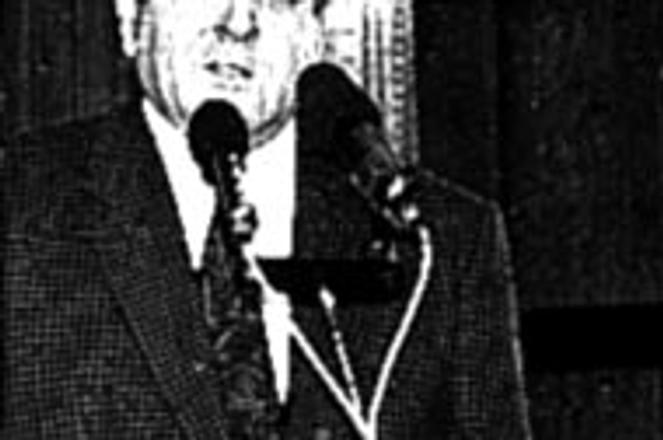Czech Premier Václav Klaus (right) has postponed indefinitely a meeting with Prime Minister Vladimír Mečiar, saying that he has no time to meet with him.TASR
The Slovak government has indicated that the race to enter European defense structures may not be entirely fair play - either with close neighbors or especially between them. The government's press office released an obscure statement on April 2, indicating that it may try to hamper the Czech Republic's planned accession into the joint American-European military alliance NATO.
The government's statement read: "The government of the Slovak Republic observes that until the present day, the Czech Republic has not settled relations with the Slovak Republic. It is not negotiating with them, nor is it willing to. One of the conditions for accession into NATO requires settlement of a country's relations with its neighbors. Therefore we deem it necessary to notify the NATO member states that in its relationship with the Slovak Republic, the Czech Republic is not fulfilling this condition."
At issue is the sudden frosting of relations between the Slovak and Czech Republics - federation brethren for 75 years until their peaceful split in 1993 - over a planned visit this month by Prime Minister Vladimír Mečiar to Prague. That visit has been indefinitely postponed over recent criticism of Bratislava by Czech media and politicians, Mečiar's spokeswoman said on April 1.
"The prime minister [Mečiar] considers the postponement of his visit as correct in view of the given political and media campaign in the Czech Republic," Mečiar's spokeswoman Magda Pospíšilová told a news conference during a regular government session. Pospíšilová said Mečiar was reacting to recent statements by Czech President Václav Havel and Premier Václav Klaus on Mečiar's planned trip to Prague, which would have been his first since the split of the Czechoslovak federation in 1993. The main purpose of the visit was to sign final agreements on the controversial division of property of the former federation, Reuters reported.
The Czech news agency ČTK quoted Havel as saying Mečiar was welcome but that he would also be told things he might not want to hear. It also quoted Klaus as saying his government had more important things to do than to prepare for Mečiar's visit.
Hearing that, the Slovak government took the offensive. The statement on NATO signed by government spokeswoman Ľudmila Buláková was an eyebrow-raiser, mainly because it was released through the Slovak and Czech wire services before it reached any of the NATO member state's missions in Bratislava.
Buláková revealed in an interview for The Slovak Spectator that the statement was released solely for the media. "Unless embassies receive the [Slovak and Czech press agency] TASR or ČTK wire services, they don't know about this statement," she said, adding that embassies "may be notified by proper diplomatic means later" but could not specify when.
Western diplomats were not the only ones left clueless. On the day the statement was released, the Slovak Foreign Ministry's press department could not comment on it, since it didn't know about it either. "Well it's possible that the ministry's press department didn't know about this because we consulted with Mr. Hamžík only this morning," Buláková said.
Mečiar's press department has accused the Czech Republic of dragging feet in settling issues left over since the Czechoslovak federation split. "[The prime minister] deems it inappropriate that the Czech Republic, who is intensely running for NATO membership, is unlawfully retaining and probably also using property of the Slovak Republic and her gold reserves. This is despite the original protocol, according to which the gold should have been ready to be divided by June 30, 1993," the statement read. Opposition parties were only too happy to enter the diplomatic melée.
"Mečiar's statements towards ... the Czech Republic are a childish and naive attempt to camouflage the inability of the Slovak government to lead the Slovak Republic into NATO," a statement issued by the Democratic Party read, adding that "since the conditions to enter the European Union are the same [as for NATO] in the field of democracy, it is absolutely clear that Slovakia led by the current ruling coalition won't be able to join the European Union either."


